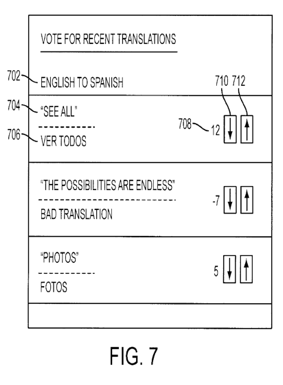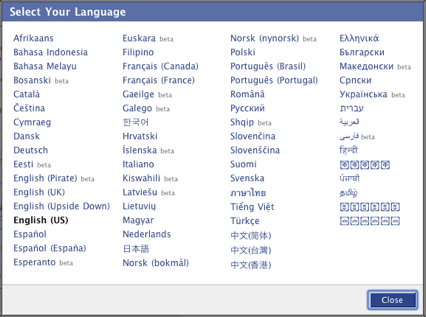 Facebook is the biggest social network in the world, so it may come as a surprise to some that up until early 2008, it didn’t offer any localized versions of the site at all. The company managed to jumpstart its international presence with an application fittingly called Translations, which took the time-consuming and costly task of translating the site and crowd-sourced it, asking the network’s millions of users to lend a hand. The process proved to be very efficient: Facebook launched a Spanish site in Feburary 2008, only a few weeks after unveiling the app, and by June it had support for 16 more languages. It’s now up to over 60, including right-to-left reading languages like Hebrew. And now, Facebook is trying to patent the process that helped turn it into an international goliath.
Facebook is the biggest social network in the world, so it may come as a surprise to some that up until early 2008, it didn’t offer any localized versions of the site at all. The company managed to jumpstart its international presence with an application fittingly called Translations, which took the time-consuming and costly task of translating the site and crowd-sourced it, asking the network’s millions of users to lend a hand. The process proved to be very efficient: Facebook launched a Spanish site in Feburary 2008, only a few weeks after unveiling the app, and by June it had support for 16 more languages. It’s now up to over 60, including right-to-left reading languages like Hebrew. And now, Facebook is trying to patent the process that helped turn it into an international goliath.
Facebook filed the patent application with the US Patent & Trademark Office in December 2008, but it only recently made its way online. The application is currently going through the office’s examination process, and you can be sure that plenty of sites are hoping it doesn’t go through.
Here’s the patent’s abstract:
Embodiments of the invention provide techniques for translating text in a social network. In one embodiment translations of text phrases are received from members of the social network. These text phrases include content displayed in a social networking system, such as content from social networking objects. A particular member is provided with content including a text phrase in a first language, and the member requests translation into another language. Responsive to this request, a translation of the text phrase is selected from a set of available translations. The selection is based on actions by friends of the member in the social network, the actions being associated with the set of available translations. These actions can the viewing of or approval of translations by the friends, for example. The selected translation is then presented to the member requesting the translation.
In layman’s terms, Facebook’s Translation app presents users with words that need to be translated, and they submit their entries. The system then invites other users to vote using Reddit-style up/down arrows to vote on which translations are best. This helps generate translations that are not just technically accurate, but also helps eliminate awkward or overly formal wording.
It’s a technique that has worked so well that other social networks have rolled out their own implementations. Hi5 launched a crowd-sourced translation model in spring 2008 (the site had already been professionally translated into 23 languages at that point), and even launched a crowdsourcing translation tool for OpenSocial developers last fall. But the reception of free crowdsourced translation hasn’t always been positive — LinkedIn recently conducted a survey to gauge what kind of incentive its users wanted to help it translate the professional networking site. The results? Most users would have been happy with some kind of free recognition, either through a leaderboard or on their profile, which is what Facebook does, but 45% expected to receive “upgraded accounts” for their efforts.

Of course, Facebook was hardly the first site to use the web to crowdsource localization. Meebo has used a user-edited Translation Wiki to generate the site’s translations since early 2006, though the site’s voting mechanisms are less robust. Now it’s up to the patent office to decide if the techniques employed by these other sites will represent prior art that would nullify Facebook’s patent. And you can be sure that’s what many people are hoping for — it would be highly frustrating for social networks down the line if they can’t leverage their own communities the way Facebook has.
